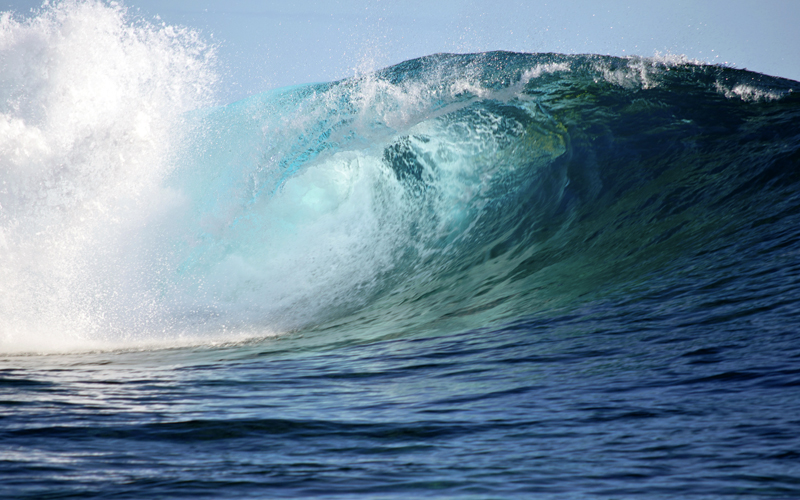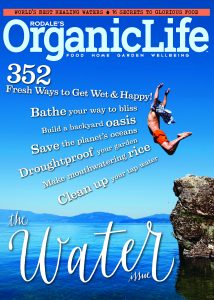
by guest blogger James Oseland, editor-in-chief of Rodale’s Organic Life
So, three issues into the brand-spanking new magazine Rodale’s Organic Life, we decided to dedicate our entire September/October issue to the subject of water. Some people thought we were a little nuts, but to our editors and me, it made perfect sense.
 Our magazine is a handbook for living naturally in the modern world, and water influences every aspect of our lives. It quenches our thirst, buoys our spirits, inspires us with its tranquil (or tempestuous, depending on the weather!) beauty. And the health of our bodies, our homes, our gardens, and our food—all of it—depends on good, clean water.
Our magazine is a handbook for living naturally in the modern world, and water influences every aspect of our lives. It quenches our thirst, buoys our spirits, inspires us with its tranquil (or tempestuous, depending on the weather!) beauty. And the health of our bodies, our homes, our gardens, and our food—all of it—depends on good, clean water.
Conversely, good, clean water depends on us. Turning the tide on water waste and pollution might seem like a tall order, but there’s a lot we can all do in our everyday lives that make a big difference.
Here are 15 easy things you can do for the world’s waters, starting today!
1. Opt for organics. You already know that organic food is better for you. Did you also know that organic crops are more water efficient than conventional? The soil on organic farms retains far more water, preventing erosion and runoff and helping the crops weather times of drought.
2. Veg out. A pound of beef takes 1,850 gallons of water to produce; a pound of veggies takes about 39. Two meatless days a week cuts your water footprint by 16 percent. Pass the kale, por favor!
3. Drink dry-farmed wines. From 2003 to 2013, we took out more water than was replenished in 21 of the world’s 37 largest aquifers. Much of that went to thirsty farms and vineyards. The good news? It turns out that wine quality is generally improved when there is little or no irrigation. Try wines from Frog’s Leap Winery in Napa, for instance, which makes acclaimed wine while saving 65,000 gallons per acre every year by dry-farming. We can all raise a glass to that!
4. Clean up your dish soap. Certain suds wreak havoc on aquatic ecosystems. Avoid products with harmful chemicals—sodium laureth sulfate, triclosan, methylisothiazolinone, ammonia, and bleach. Check out the Environmental Working Group’s recommended list of soaps for more info.
5. Give bottles the boot. Over a quarter of it sold comes from the tap anyway! Carry a filled canteen instead of buying one-time-use plastic bottles of water. (If you’re travelling overseas where the taps don’t run so clean, purify tap water with iodine tablets or tote a filter bottle like the collapsible Vapur.
6. Get wet! Connect with the blue stuff by swimming, kayaking, and sailing responsibly. Surfers can ride the environmentalist wave with surfrider.org. Scuba fans can dive deeper into conservation work with projectaware.org.
7. Sweep, don’t spray. Rather than hosing down your patio, which wastes water and carries contaminants into freshwater systems, sweep it! Bonus: The exercise will help you burn a few extra calories.
8. Eat sustainable seafood. Use buying guides like Monterey Bay Aquarium’s Seafood Watch and NOAA’s FishWatch to find the best choices.
9. Make your roof part of the solution. Direct your rain gutters so they drain onto the lawn. It stops pollutants from washing off hardscaping into storm pipes, and will keep your lawn looking lush, besides!
10. Clean a beach. Mark your calendars for the International Coastal Cleanup this September 19! Let’s see if we can beat 2014’s 16 million pounds of collected trash. Learn more at signuptocleanup.org.
11. Shop smarter. When buying toilets and other household appliances, look for products carrying the EPA’s green-and-blue label—they use less water and save you money with every flush.
12. Junk your junk mail. Yearly, bulk mail produces more greenhouse gas than 9 million cars, destroys 100 million trees, and takes 28 billion gallons of water to make and recycle. For $35, 41pounds.org will stop it for you.
13. Skip SeaWorld. In the sea, high-IQ mammals travel far and live socially; in captivity, often forced to perform, they suffer stress. Opt for more Flipper-friendly family fun at ethical research institutes like Baltimore’s National Aquarium, which runs a dolphin rescue-and-release operation.
14. Oppose arctic drilling. As of this year, Shell has permission to drill for oil in Alaska’s Chukchi Sea, a fragile ecosystem that’s home to endangered wildlife. The harsh weather and seas make a spill probable and cleanup near impossible—all for just three years’ worth of the world’s oil needs. Get involved at greenpeace.org.
15. Get in the zones. Support ocean conservation zones, which prevent activities like fishing and mining where ecosystems are thriving. Visit globaloceanlegacy.org to learn how to help.
 James Oseland, editor-in-chief of Rodale’s Organic Life, most recently served as editor-in-chief of Saveur, where he led the magazine to more than 40 awards, including three from the American Society of Magazine Editors and numerous James Beard journalism awards. He’s also been a judge for five seasons of Bravo TV’s Top Chef Masters. His 2006 memoir, Cradle of Flavor, was named one of the best books of the year by the New York Times and was recognized by the James Beard Foundation and the International Association of Culinary Professionals. Outside the office, James keeps himself centered by hiking, cooking, and pitching in at the Rodale Institute’s organic farm.
James Oseland, editor-in-chief of Rodale’s Organic Life, most recently served as editor-in-chief of Saveur, where he led the magazine to more than 40 awards, including three from the American Society of Magazine Editors and numerous James Beard journalism awards. He’s also been a judge for five seasons of Bravo TV’s Top Chef Masters. His 2006 memoir, Cradle of Flavor, was named one of the best books of the year by the New York Times and was recognized by the James Beard Foundation and the International Association of Culinary Professionals. Outside the office, James keeps himself centered by hiking, cooking, and pitching in at the Rodale Institute’s organic farm.




Such a thoughtful article, James. Thank you for the ideas shared. I am bewildered why we our governing body isn’t demanding more water conservation. When I drive past our magnficent Delaware River and see the low levels confirmed by rock exposure, I think of the water problems in California.
Regarding your article. May I make one suggestion? You have many useful links in your article that takes me, the reader, off your page. In the future is it possible to have the links open in a new window?
From my bones to yours,
Irma Jennings
http://www.food4healthybones.com
Thanks for all the good advice and information. I wish the whole world knew about Rodale’s family of good, organic advice and knowledge!! And I am so, so grateful to the Rodale family and all the many wonderful people who work there, without that one group our world would be so much less healthy and we would be so much less educated!!